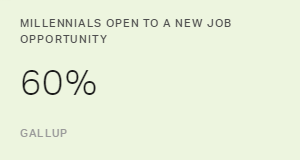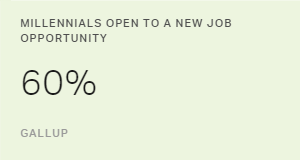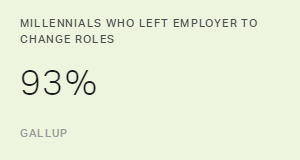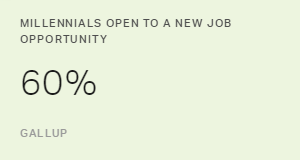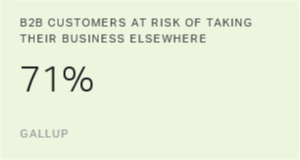Story Highlights
- Millennials have low attachment to political parties and companies
- Millennials may feel unattached to coworkers
- Only 50% plan to be with their company one year from now
It's a contradiction: Millennials are extremely digitally connected, yet they are unattached to institutions and employers.
Members of this generation (born between 1980 and 1996) use technology of all shapes and sizes -- including smartphones, social media, text messages and emails -- to maintain constant connectedness with the world around them.
But while millennials are 11 times more likely than those of older generations to report using Twitter and are nearly 40% more likely to send and read emails, their levels of engagement and attachment with traditional political institutions and employers are significantly lower than those among members of older generations.
Unattached to Traditional Institutions
According to Gallup's report How Millennials Want to Work and Live, the appeal of major political parties is largely waning among this generation: The plurality of millennials (44%) describe themselves as politically independent, with only 28% of millennials identifying as Democrats and 19% as Republicans.
Given these findings, it may come as no surprise that millennials also tend to feel a general lack of attachment to their workplaces.
Millennials are the least likely generation to be engaged at work, as just 29% are "engaged" -- involved in, enthusiastic about and committed to their work. However, millennials are also one of the least likely generations to be actively disengaged in their work. This means that a vast majority of millennial employees (55%) are "not engaged," meaning they are neither engaged nor actively disengaged -- they feel more or less indifferent about their work, without close ties to their jobs or companies.
Gallup's data also suggest that millennials may feel unattached to their coworkers: Only 43% strongly agree they know what their coworkers are expected to do at work, which is significantly lower than the 57% of members of older generations who say the same.
Further, most millennials don't identify with their company's purpose. Only about one in three millennials strongly agree that the mission or purpose of their organization makes them feel their job is important -- a big problem, considering the business and strategic advantages of rallying employees around a mission.
What Business Leaders Can Do
For business leaders, these data point to the need to enact proven strategies for engaging millennial employees and winning their commitment. Unless organizations focus on and execute the right tactics, millennials' lack of engagement at work will continue -- along with their tendency to job-hop.
Twenty-one percent of millennials have changed jobs within the past year, six in 10 are open to different job opportunities and only 50% plan to be with their company one year from now. But when millennials can strongly agree that they know what their organization stands for and what makes it different from its competitors, 71% say that they plan to stay with their company for at least another year -- a 42% improvement compared with millennials on average.
Equipping and informing managers is one powerful strategy for engaging employees. Managers can foster millennials' attachment to the company by meeting regularly with each employee; Gallup finds that employee engagement is highest among employees who meet with their manager at least once a week. Brief daily check-ins are even better.
Managers can foster engagement by promoting team alignment among team members, with other teams and with the company's overall mission and purpose. Millennials want to understand how their role fits in with the bigger picture and what makes their company unique. The emphasis for this generation of employees has switched from paycheck to purpose -- and company cultures need to follow suit.
The reality is that millennials view certain institutions differently than their predecessors do, and those views have shaped their decisions to engage -- or not to engage -- with those institutions. With millennials projected to dominate the workforce in the very near future, organizations and institutions that proactively seek to engage millennials and win their commitment will come out on top.
